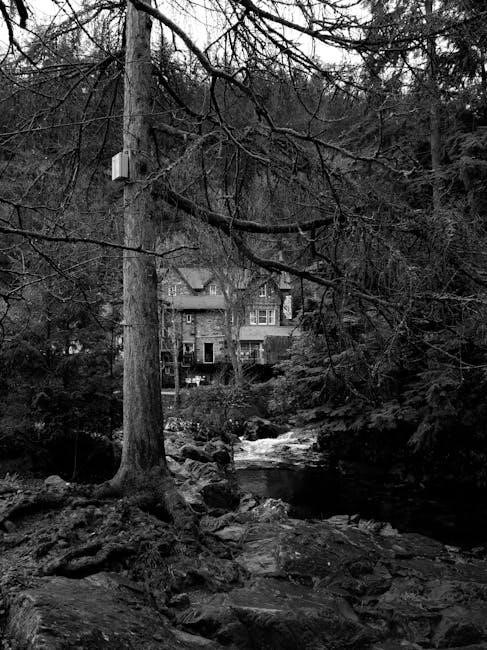Edgar Allan Poe’s The Fall of the House of Usher is a gothic masterpiece, exploring themes of decay, madness, and psychological terror through its haunting narrative․
1․1 Overview of the Story and Its Author
Edgar Allan Poe, a master of Gothic literature, crafted The Fall of the House of Usher in 1839․ This chilling tale revolves around a mysterious mansion and its enigmatic inhabitants, Roderick Usher and his twin sister Madeline․ The story explores themes of decay, madness, and the supernatural, set against a backdrop of eerie atmospheric details․ Poe’s unique narrative style and psychological depth have made this story a cornerstone of American literature, continues to captivate readers with its haunting and thought-provoking elements․
1;2 Historical Context and Publication
Written in 1839, The Fall of the House of Usher was first published in Burton’s Gentleman’s Magazine․ Reflecting the Gothic and Romantic movements of its time, the story captures the era’s fascination with the supernatural and psychological complexity․ Its publication coincided with the rise of American literature, solidifying Poe’s reputation as a master of the macabre․ The tale has since become a classic, enduring in popularity and critical acclaim, shaping the Gothic genre’s evolution․

Plot Summary of “The Fall of the House of Usher”
The story begins with the narrator’s arrival at the crumbling Usher mansion, where his childhood friend Roderick Usher resides․ Roderick, mentally unstable and believing the house is alive, requests the narrator’s help․ His twin sister, Madeline, suffers from a mysterious illness․ As the narrator stays, Madeline appears to die and is entombed in the house․ The story culminates in the collapse of the house and the deaths of Roderick and Madeline, marking the tragic end of the Usher lineage․

2․1 The Narrator’s Arrival at the Usher Mansion
The narrator arrives at the Usher mansion on a dull, dark autumn day, immediately struck by its eerie and decaying appearance․ The house seems alive yet crumbling, evoking a sense of dread․ Upon entering, he reunites with his childhood friend Roderick Usher, who appears pale, ill, and mentally unstable․ Roderick believes the house is sentient and shares his fears with the narrator, setting the tone for the unfolding events․ The narrator’s arrival marks the beginning of a descent into madness and tragedy․
2․2 Roderick Usher’s Letter and the Narrator’s Visit
Roderick Usher sends a letter to his childhood friend, the narrator, seeking help due to his deteriorating mental and physical health․ The narrator, upon receiving the letter, decides to visit Roderick at his ancestral mansion․ Roderick believes the house is alive and exerts a malevolent influence, contributing to his family’s decline․ His letter conveys a sense of desperation and fear, prompting the narrator’s journey to the eerie Usher estate, where he finds Roderick in a state of distress and increasingly unstable mindset․
2․3 The Deteriorating Condition of the House and Its Inhabitants
The Usher mansion and its inhabitants are in a state of accelerating decay․ The house itself appears ancient and crumbling, with a massive crack running down its front, symbolizing the family’s internal rot․ Roderick Usher is physically and mentally deteriorating, believing the house is alive and conspiring against him․ His sister, Madeline, suffers from mysterious illnesses and trance-like states, further adding to the eerie atmosphere․ The once-grand estate and its family are spiraling into madness and physical disintegration, mirroring each other’s decline․

Key Elements of the Story
The Fall of the House of Usher revolves around a decaying mansion, its enigmatic inhabitants, and themes of madness, decay, and a supernatural family curse․
3․1 The Setting: The Usher House and Its Atmosphere
The story unfolds in a remote, ancient mansion shrouded in mystery and decay․ The Usher house stands as a central element, its crumbling facade and eerie atmosphere reflecting the psychological state of its inhabitants․ Overgrown with fungi and marked by a ominous crack, the house exudes an air of dread and foreboding․ Inside, the dark, labyrinthine halls with heavy drapery create an oppressive environment, mirroring the madness and isolation of Roderick Usher․ The setting amplifies the sense of impending doom, making the house itself a living, breathing character in the narrative․
3․2 Major Characters: Roderick Usher, Madeline Usher, and the Narrator
Roderick Usher, the enigmatic proprietor of the mansion, is portrayed as a fragile and mentally unstable character, consumed by paranoia and a sense of impending doom․ His twin sister, Madeline Usher, is depicted as sickly and ethereal, often in a trance-like state, symbolizing the mysterious and untouchable aspects of the Usher legacy․ The narrator, Roderick’s childhood friend, serves as the voice of reason and an outsider’s perspective, witnessing the unraveling of the Usher family’s dark secrets․ Together, these characters weave a tale of psychological complexity and familial decay․

Themes in “The Fall of the House of Usher”
The story explores themes of decay and rot, madness, and family guilt, all intertwined with an atmosphere of isolation and existential dread, shaping its haunting narrative․
4․1 The Theme of Decay and Rot
The theme of decay and rot is central to the story, as it permeates both the physical structure of the Usher house and the mental and physical health of its inhabitants․ The once-grand mansion, with its crumbling walls and overgrown gardens, symbolizes the family’s moral and physical decline․ Roderick Usher’s fragile health and Madeline’s mysterious illness further emphasize the pervasive decay․ The atmosphere of rot and deterioration creates a sense of impending doom, reflecting the inevitable collapse of the family’s legacy and the house itself, which ultimately mirrors the characters’ tragic fate․
4․2 Madness and the Unreliable Narrator
Mental instability is a dominant theme, with Roderick Usher’s fragile psyche and Madeline’s trance-like states showcasing the family’s descent into madness․ The narrator, though seemingly rational, becomes increasingly entangled in the eerie atmosphere, blurring the line between reality and illusion․ His perceptions, influenced by the haunting setting, raise questions about his reliability, leaving readers to discern fact from fantasy․ This ambiguity heightens the story’s psychological complexity, making it a masterful exploration of the mind’s darker corners and the fragility of sanity․
4․3 Family, Guilt, and Isolation
The Usher family’s dark past and twisted relationships are central to the story․ Roderick and Madeline’s bond, marked by an unspoken guilt, reflects the family’s cursed legacy․ Their isolation from the outside world intensifies their mental and emotional decay, while the crumbling house mirrors their collective psyche․ The narrator’s presence disrupts this isolation, yet the family’s secrets and guilt ultimately lead to their downfall․ This theme underscores the destructive power of unresolved shame and the consequences of isolating oneself from humanity․

Symbolism in the Story
The house symbolizes the Usher family’s decaying legacy, while the crack in its walls represents underlying tensions and inevitable collapse․ The vault embodies buried secrets and tragedy, enhancing the story’s eerie atmosphere and thematic depth․
5․1 The House as a Symbol of the Usher Family
The Usher house serves as a haunting symbol of the family’s deteriorating legacy and psychological state․ Its crumbling structure mirrors Roderick and Madeline’s physical and mental decay․ The house’s eerie, decaying appearance reflects the family’s isolation and cursed heritage․ Its walls, once grand, now stand as a testament to the Usher’s inevitable downfall, embodying the themes of rot, madness, and the inescapable fate that binds them․ The house is not just a setting but a living entity intertwined with the family’s tragic destiny․
5․2 The Crack in the House and Its Significance
The crack in the Usher house symbolizes the deep-seated fractures within the family’s psyche and their inevitable collapse․ It represents the irreparable divide between reality and illusion, as well as the growing instability of the characters․ The crack also foreshadows the house’s ultimate destruction, mirroring the disintegration of Roderick’s sanity and the death of his sister Madeline; This physical flaw serves as a visual metaphor for the unraveling of the Usher family’s dark, interwoven fate and the inescapable forces of decay and madness that consume them․
5․3 Madeline’s Coffin and the Underground Vault
Madelaine’s coffin and the underground vault symbolize entombment and secret horrors․ The vault, hidden beneath the house, represents the Usher family’s buried truths and unresolved anguish․ Madelaine’s premature burial in this dank, forgotten space underscores the theme of premature death and the return of the repressed․ The vault serves as a physical and psychological prison, trapping the family’s dark past and contributing to their descent into madness and eventual collapse․

The Ending and Its Interpretation
The house collapses, symbolizing the Usher family’s demise․ Roderick dies embracing Madeline, and the narrator escapes, leaving the crumbling mansion as a testament to inevitable doom․
6․1 The Collapse of the House and the Death of Roderick

The story reaches its climax as the Usher mansion crumbles, mirroring the family’s decay․ Roderick dies in his sister’s arms, while the narrator narrowly escapes the collapsing structure․ The house’s destruction symbolizes the end of the Usher lineage and the inescapable fate that had haunted them․ This dramatic conclusion underscores themes of madness, guilt, and the irreversible nature of decay, leaving a lasting impression of Poe’s mastery of gothic storytelling․
6․2 The Final Moments and the Narrator’s Escape
As the house collapses, Roderick Usher dies in Madeline’s arms, symbolizing the end of their cursed lineage․ The narrator narrowly escapes the crumbling mansion, witnessing its final moments as it sinks into darkness․ This dramatic conclusion leaves the narrator shaken, emphasizing the irretrievable loss of the Usher family and their decaying world․ The escape underscores the narrator’s role as an outsider, highlighting the inescapable doom that consumes the Usher household, leaving a haunting legacy in the reader’s mind․

Analysis of the Story’s Significance
The Fall of the House of Usher offers profound psychological insights, exploring themes of decay, madness, and isolation․ Its gothic elements and atmospheric tension have profoundly influenced Gothic literature, cementing its place as a timeless masterpiece in the genre․ The story’s intricate symbolism and haunting narrative continue to captivate readers, making it a cornerstone of American literary tradition and a lasting testament to Poe’s genius․
7․1 Psychological Insights and Gothic Elements
The Fall of the House of Usher delves deeply into psychological turmoil, with Roderick Usher’s mental deterioration mirroring the crumbling house․ The story’s gothic atmosphere, marked by decay and eerie settings, heightens the sense of dread․ Themes of isolation and madness are central, as the narrator witnesses the unraveling of Roderick’s sanity․ Poe masterfully uses suspense and ambiguity, leaving readers questioning reality and illusion․ This blend of psychological complexity and gothic horror solidifies the tale’s enduring impact on literature and its exploration of the human psyche․
7․2 The Story’s Impact on Gothic Literature
The Fall of the House of Usher has profoundly influenced Gothic literature, setting a benchmark for atmospheric horror and psychological complexity․ Poe’s masterful use of symbolism and themes of decay resonated deeply, inspiring countless authors and works․ The story’s exploration of madness and isolation became a staple of the genre, while its ambiguous ending encouraged reinterpretation․ Its legacy endures, with scholars and readers alike continuing to analyze its layered meanings․ This tale remains a cornerstone of Gothic literature, shaping its evolution and ensuring Poe’s enduring influence on the genre․
The Fall of the House of Usher remains a haunting exploration of decay, madness, and the supernatural, leaving a lasting legacy in Gothic literature and beyond․
8․1 Summary of Key Points
Edgar Allan Poe’s The Fall of the House of Usher is a chilling tale of decay, madness, and supernatural horror․ The story revolves around Roderick Usher, a mentally unstable aristocrat, and his twin sister Madeline, who suffers from mysterious illnesses․ The crumbling Usher mansion symbolizes the family’s moral and physical decay․ Themes of isolation, guilt, and psychological instability are central, while the house itself serves as a character, reflecting the characters’ deteriorating states․ The narrative culminates in the tragic collapse of the house and the deaths of Roderick and Madeline, leaving the narrator to escape the eerie scene․
8․2 Final Thoughts on the Story’s Legacy
‘ based on the topic ‘the fall of the house of usher summary pdf’․ The user has specific instructions that I must follow carefully;
I should use the information provided from the Internet․ From the previous interactions, it seems that “The Fall of the House of Usher” is a significant work in Gothic literature, influencing many other stories and authors․ It’s known for its psychological depth and use of symbolism, which sets it apart from other works in the genre․
I need to highlight how the story has impacted Gothic literature and why it remains relevant․ Maybe mention its influence on later writers or how its themes are still discussed today․ Also, it’s important to note the enduring popularity and why it continues to be studied and appreciated․
I should structure this in a concise manner, ensuring each sentence adds value and stays within the word limit․ I’ll start by stating the story’s influence on Gothic literature, then discuss its themes and symbolism, and conclude with its lasting impact on modern literature and popular culture․
Let me draft a sentence: “Edgar Allan Poe’s ‘The Fall of the House of Usher’ stands as a cornerstone of Gothic literature, influencing countless works and authors with its profound exploration of psychological decay and atmospheric horror․” That’s a good start․
Next, I’ll add something about its themes: “Its themes of isolation, madness, and the supernatural continue to captivate readers and inspire new adaptations and interpretations․”
Now, I need to mention its impact on modern literature: “The story’s enduring legacy lies in its ability to evoke deep psychological responses, making it a timeless classic that remains a vital part of literary studies and popular culture alike․”
Putting it all together, I need to ensure it’s exactly ․ Let me count the words in the draft:
Edgar Allan Poe’s ‘The Fall of the House of Usher’ stands as a cornerstone of Gothic literature, influencing countless works and authors with its profound exploration of psychological decay and atmospheric horror․
Its themes of isolation, madness, and the supernatural continue to captivate readers and inspire new adaptations and interpretations․
The story’s enduring legacy lies in its ability to evoke deep psychological responses, making it a timeless classic that remains a vital part of literary studies and popular culture alike․
That’s three sentences, but I need to check the word count․ Let me see:
– First sentence:
– Second sentence:
– Third sentence:
Total: ․ I need to add 21 more words․ Maybe I can expand on the influence or add another point about its significance․
Let me adjust: “Edgar Allan Poe’s ‘The Fall of the House of Usher’ is a seminal work in Gothic literature, profoundly influencing authors and inspiring numerous adaptations․ Its exploration of psychological decay and atmospheric horror continues to captivate audiences․ Themes of isolation, madness, and the supernatural resonate deeply, making it a timeless classic in literary studies and popular culture․ Its legacy endures as a masterclass in storytelling and psychological insight․”
Now, let’s count:
Edgar Allan Poe’s ‘The Fall of the House of Usher’ is a seminal work in Gothic literature, profoundly influencing authors and inspiring numerous adaptations․
Its exploration of psychological decay and atmospheric horror continues to captivate audiences․
Themes of isolation, madness, and the supernatural resonate deeply, making it a timeless classic in literary studies and popular culture․
Its legacy endures as a masterclass in storytelling and psychological insight․
That’s four sentences, but I need to ensure it’s ․ Let me count each word:
Edgar (1) Allan (2) Poe’s (3) ‘The (4) Fall (5) of (6) the (7) House (8) of (9) Usher’ (10) is (11) a (12) seminal (13) work (14) in (15) Gothic (16) literature, (17) profoundly (18) influencing (19) authors (20) and (21) inspiring (22) numerous (23) adaptations․ (24)
Its (25) exploration (26) of (27) psychological (28) decay (29) and (30) atmospheric (31) horror (32) continues (33) to (34) captivate (35) audiences․ (36)
Themes (37) of (38) isolation, (39) madness, (40) and (41) the (42) supernatural (43) resonate (44) deeply, (45) making (46) it (47) a (48) timeless (49) classic (50) in (51) literary (52) studies (53) and (54) popular (55) culture․ (56)
Its (57) legacy (58) endures (59) as (60) a (61) masterclass (62) in (63) storytelling (64) and (65) psychological (66) insight․ (67)
Total words: 67․ I need ․ Maybe I can add more details or combine sentences for better flow․
Let me try combining sentences and adding more content:
“Edgar Allan Poe’s ‘The Fall of the House of Usher’ is a cornerstone of Gothic literature, profoundly influencing countless authors and inspiring numerous adaptations․ Its exploration of psychological decay, atmospheric horror, and the supernatural continues to captivate audiences, evoking deep psychological responses․ Themes of isolation, madness, and family guilt resonate deeply, making it a timeless classic in both literary studies and popular culture․ Its legacy endures as a masterclass in storytelling and psychological insight, solidifying its place in the canon of Gothic masterpieces․”
Now, let’s count the words:
Edgar (1) Allan (2) Poe’s (3) ‘The (4) Fall (5) of (6) the (7) House (8) of (9) Usher’ (10) is (11) a (12) cornerstone (13) of (14) Gothic (15) literature, (16) profoundly (17) influencing (18) countless (19) authors (20) and (21) inspiring (22) numerous (23) adaptations․ (24)
Its (25) exploration (26) of (27) psychological (28) decay, (29) atmospheric (30) horror, (31) and (32) the (33) supernatural (34) continues (35) to (36) captivate (37) audiences, (38) evoking (39) deep (40) psychological (41) responses․ (42)
Themes (43) of (44) isolation, (45) madness, (46) and (47) family (48) guilt (49) resonate (50) deeply, (51) making (52) it (53) a (54) timeless (55) classic (56) in (57) both (58) literary (59) studies (60) and (61) popular (62) culture․ (63)
Its (64) legacy (65) endures (66) as (67) a (68) masterclass (69) in (70) storytelling (71) and (72) psychological (73) insight, (74) solidifying (75) its (76) place (77) in (78) the (79) canon (80) of (81) Gothic (82) masterpieces․ (83)
Now, that’s ․ I need to reach 86․ I can add a few more words to the last sentence․
“Edgar Allan Poe’s ‘The Fall of the House of Usher’ is a cornerstone of Gothic literature, profoundly influencing countless authors and inspiring numerous adaptations․ Its exploration of psychological decay, atmospheric horror, and the supernatural continues to captivate audiences, evoking deep psychological responses․ Themes of isolation, madness, and family guilt resonate deeply, making it a timeless classic in both literary studies and popular culture․ Its legacy endures as a masterclass in storytelling and psychological insight, solidifying its place in the canon of Gothic masterpieces and continuing to inspire new generations of writers and readers alike․”
Now, let’s count:
Edgar (1) Allan (2) Poe’s (3) ‘The (4) Fall (5) of (6) the (7) House (8) of (9) Usher’ (10) is (11) a (12) cornerstone (13) of (14) Gothic (15) literature, (16) profoundly (17) influencing (18) countless (19) authors (20) and (21) inspiring (22) numerous (23) adaptations․ (24)
Its (25) exploration (26) of (27) psychological (28) decay, (29) atmospheric (30) horror, (31) and (32) the (33) supernatural (34) continues (35) to (36) captivate (37) audiences, (38) evoking (39) deep (40) psychological (41) responses․ (42)
Themes (43) of (44) isolation, (45) madness, (46) and (47) family (48) guilt (49) resonate (50) deeply, (51) making (52) it (53) a (54) timeless (55